First National Bank of Jewell
(since 1974, the building used
as Jewell's City Hall )
First National Bank of Jewell
(since 1974, the building used
as Jewell's City Hall )
The First National Bank of Jewell Junction had its beginning with the dissolving of the Farmers And Traders State Bank which had organized on April 25 of 1893 with a capital stock of $80,000. A. Alexander was the president and Att. Alexander was the cashier of that old bank in Jewell.
On June 17, 1893 the bank was discontinued and the corporation dissolved. Those early owners then organized the First National Bank of Jewell Junction. The bank was organized on February 28, 1901 and chartered on March 15, 1901. The head officer in 1912 was President H. C. Smith. During its nearly thirty years in business, the First National constructed its new building in 1910 on the northwest corner of Main and King Street. (It is now Jewell City Hall.) Owing to the nation-wide depression that began in 1929, the bank fell on hard times as was placed in conservatorship March 24, 1933. A conservatorship meant an assumed control of the bank in order to ensure its financial stability and safe-and sound operation. On November 3, 1933, the bank entered into receivership when a person was placed in the custodial responsibility for the property of others, including tangible and intangible assets and rights when the bank did not meet its financial obligations before filing for bankruptcy. The First National Bank survived under receivership until August 2, 1934. The reorgaized Farmers State Bank then operated from the building.
From a news article published March 2, 1901:
An important change in the banking interests of Jewell, and one that means a great deal to the future interests of the town in a financial sense, took place Thursday by the organization of the First National Bank of Jewell Junction with a capital of $25,000 which succeeds the Farmers & Traders Bank.
The new organization numbers among its shareholders the most wealthy farmers, merchants and capitalists in the county and will be considered one of the solid institutions from the start. The stockholders met in the rooms of the Farmers & Traders Bank, Thursday, and elected the following men as directors: H. C. Smith, G. W. Hill, D. J. Lowry, L. A. McMurray, A. C. Voss, H. J. Wulfsburg and James B. Thompson, who qualified and selected from the number as president of the Bank H. C. Smith; vice president, James B. Thompson. A. Alexander will be cashier, and F. H. Alexander assistant cashier.
Howard Clarence Smith, the president, is a man of wide business experience, possessing a fine education, and has a thorough knowledge of the duties entrusted to him and is in every respect well qualified to fill the office of president.
Mr. Thompson, the vice president, is a hustling young farmer and the man who will put forth every effort in the advancement of the bank's business and welfare. He is the right man in the right place.
The
board of directors is made up of men possessing broad and liberal views,
yet are known to be the most conservative men in this part of the county,
and as they have full and complete control of the bank's affairs there
will be no question in the minds of the people that nothing but strict
business principles in the conducting of the business will be tolerated.
All in all the First National Bank is composed of a class of our
citizens whose association together is whith the one purpose only in view,
viz: that of establishing and maintaining a solid and substantial
bank which means much to the town of Jewell and surrounding territory and
we believe will be duly appreciated.
| Among the list of shareholders appear the folowing names | ||
| Jewell:
|
H. J. Wulfsburg
D. J. Lowry T. I. Thompson Geo. W. Hill A. A. Furman Jas. B. Thompson J. C. Riddle Lela M. Warburton Howard C. Smith Ed Swift T. F. Baldus |
V. F. Cole
A. C. Voss Jas. Troy Byron Lewis J. E. Glaman H. K. Gronbech Chris Bieshiem P. K. Kristofferson Hans Henrykson Clyde Harman Chas Sidenstucker |
| Webster City: | J. L. Kamrar
L. A. McMurray J. O. Lenning |
Geo. S. Neel
Anna C. Smith |
| Ellsworth: | M. H. Brinton | |
| Independence: | Cynthia George | |
From a news article (on display at the Jewell Museum) published June 2, 1905:
The First National Bank
What it is. What it does. Where to do Banking
The First National Bank of Jewell Junction, Iowa, is an organization controlled by the government of the United States and by law is authorized to receive money on deposit, make loans, issue currency, make collections and act as agent in financial transactions.
The main object in establishing National Banks was to provide a place where depositors can leave their money feeling that it may be returned to them when called for, instead of being squandered in wild land speculations or worthless securities. The accomplishment of this cannot be denied and the National Bank has long since past the experimental stage, its protective features fully realized and it is thoroughly interwoven in the national life.
This bank has a paid up capital of $25,000.00 and is proud to number among its stockholders the wealthiest, most substantial and conservative men in the county. Its board of directors whose interests practically all center in and around Jewell, are men that inspire confidence in the people, and its officers having been actively engaged in the banking business in Jewell for the past fifteen years, being thoroughly familiar with all the details of the bank and needs of its customers, which together with the additional advantages and protection offered by the laws of our nation, commends it to you as the most desirable institution with which to do business.
Open an account with it, become acquainted with its officers and their method of doing business, at the same time giving them the opportunity of becoming acquainted with you, and you will obtain many advantages and conveniences accrueing by reason thereof.
It receives your money, no matter how much or how little, and issues therefor its certificates of deposit, payable any time desired but if left three months will pay 4% interest. 4½% interest will be paid for six month certificates, and 5% for one year.
It received your account no matter how large or small, providing for the purpose free of charge, a book in which all deposits are entered by the bank and which serves as a receipt thereof, also checks for use in withdrawing the money in amounts and at all times desired.
It loans you money at the lowest current rates, is liberal in this respect especially to customers doing business with it and with whom it is acquainted, and extends to its patrons all advantages, accomodations and courtesies a conservative person will ask from it.
It issues drafts on all the principal points of the world which provides the safest and cheapest way to transmitting money from place to place, as the money can only be obtained by the party to whom it is made payable and then only upon proper identification and endorsement and if the draft is lost or destroyed, a duplicate will be issued or money refunded as is desired.
It receives and transmits taxes to the county treaurer without charge to the taxpayer, and acts as agent in all financial transactions.
It provides safty deposit boxes at a rental of 50¢ per year in which valuable papers may be safely and privately deposited. It believes that strict integrity is the foundation of all legitimate business success, places no limit to its ambition. It pushes for more business in busy seasons, and if customers are scarce, stll pursues. It believes in judicious advertising, but never advertises its competitors by adverse criticisms.
The following well-known persons compose the stockholders of the institution: H. J. Wulfsbur, J. L. Kamrar, L. A. McMurray, W. A. Neels, A. C. Smith, D. J. Lowry, Clyde Harman, T. I. Thompson, Geo. W. Hill, A. A. Furman, J. B. Thompson, H. Henrykson, H. C. Smith, M. H. Brinton, James Troy, L. M. Warburton, H. K. Gronbech, Chas. Sidenstucker, H. B. Cole, B. S. Millett, A. Lewis, F. W. Entriken.
Its board of directors are: H. C. Smith, L. A. McMurray, D. J. Lowry, J. B. Thompson, A. A. Forman, H. B. Cole, Geo. W. Hill, and its officers are: H. C. Smith, President; J. B. Thompson, Vice-President; and Att. Alexander, Cashier.
Tuesday afternoon of this week the contract for the erection of the new First National Bank building was awarded to C. W. Ennis, of Toledo, the lowest bidder. There were six bidders for the contract, Pfund Lumber Co. of Jewell being the next to the lowest bidder. Ennis' bid for the erection of the naked building was $6775. His bid for this contract does not include the vault and safe and equipment, nor any of the interior fixtures, nor hardware, plumbing, heating nor lighting. All this work not included in Ennis' contract will be given in separate contracts and will be awarded in the near future. It is estimated that this remaining work will total up to about four thousand, bringing the total cost of the building when completed considerably over ten thousand dollars.
This 1910 photo shows the construction
of the corner building which would be the home of Jewell's First National
Bank.
This same building has served
as Jewell's City Hall since 1974.
1911
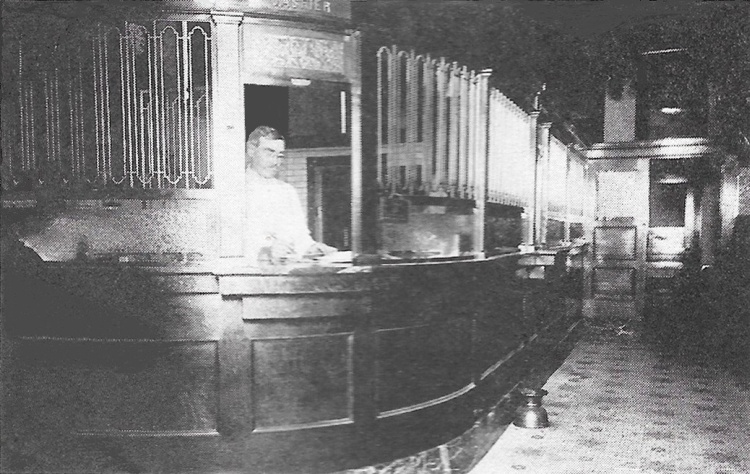
Howard Clarence Smith in Jewell's First National Bank
Howard C. Smith was born in Ohio in 1858, son of Nathan and Mary LcLane Smith. In 1884 he received a Bachelor of Arts degree from Ohio Wesleyan University and the same year moved to Iowa in Hamilton County, having purchased one half section of farm land in section 17, Lyon Township (see township map below). Howard then served as High School principal of Jewell High School from 1887-1888. A partnership with his brother J. Sterling Smith was formed in 1892, known as Smith Bros., dealers in grain in Jewell. In 1901 he was named as president of the newly organized First National Bank of Jewell Junction.
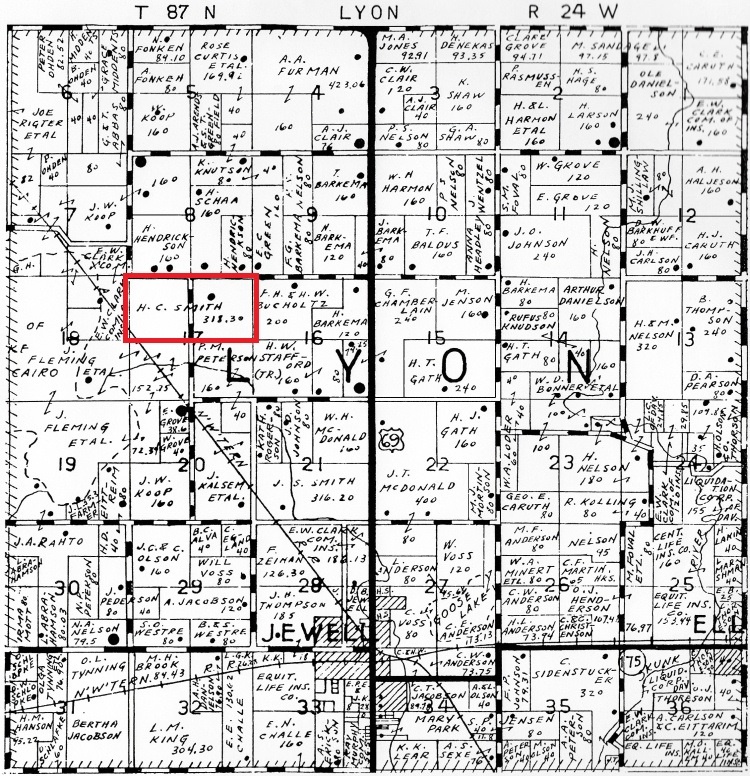
In 1902 Mr. Smith moved into
town and was named mayor of Jewell. ![]()
He was a member of the Masonic
Lodge and the Knights of Pythias.
Howard married Ida Watsabaugh
in 1909.
|
|
|
|
President -
Vice-President - Cashier - Assistant Cashier - |
Howard Clarence Smith, 1901-1933
J. B. Thompson, 1901-1909 J. Sterling Smith, 1909-1933 Att. Alexander, 1901-1922 Lester L. Billings, 1920-1933 F. H. Alexander, 1901-1920 Cora E. Alexander, 1926-1933 |
| First National
Bank of Jewell Junction - Charter No. 5743
Organized on February 28, 1901 with a capital of $25,000 Chartered on March 15, 1901 Succeeded the Farmers and Traders Bank Placed in conservatorship on March 24, 1933 Placed in receivorship on Nov. 3, 1933 with a capital of $25,000 |
|
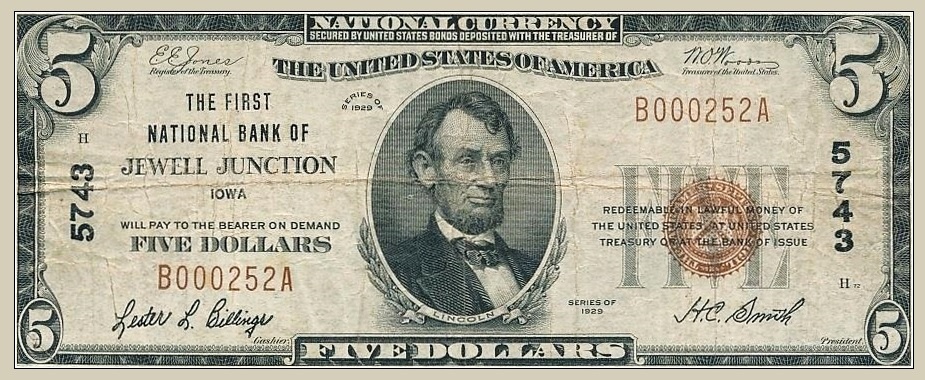
Jewell's First National Bank lasted until receivorship on August 2, 1934.
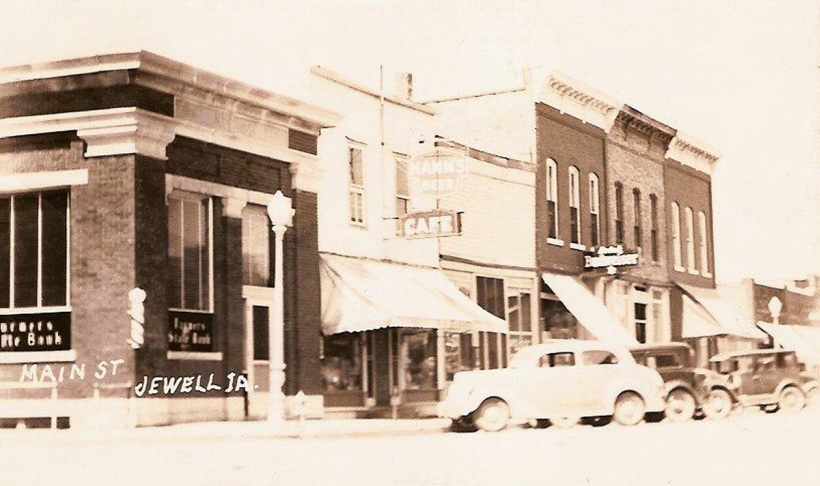
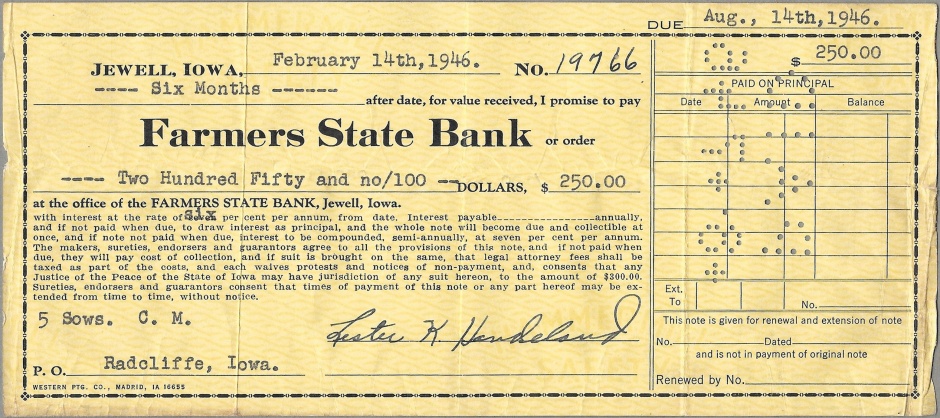
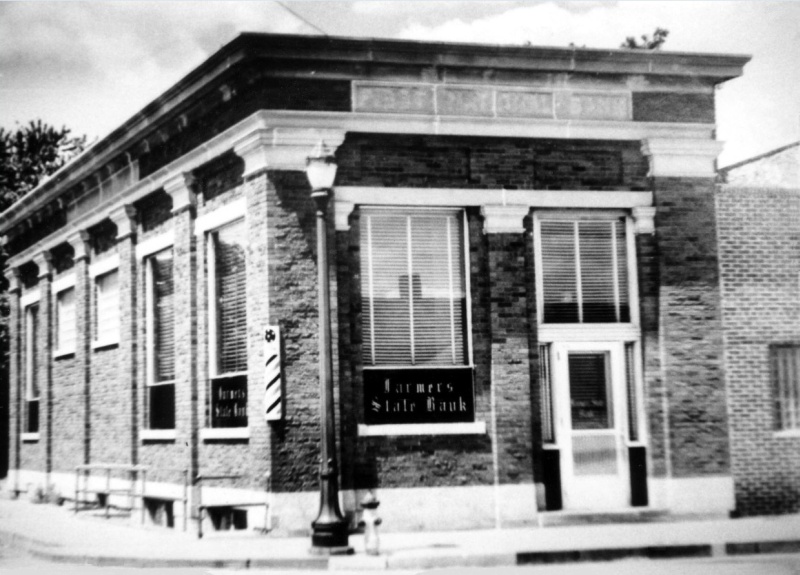
|
|
|
|
President
Vice-President and cashier Assistent cashier Cashier 1923-1925 Bookkeepers
|
Carl Queensland
G. C. Rorem Lloyd Walker Sterling Alexander Peggy Hanson Maxine Schaa Margaret Brekke Esther Mansager Lorraine Vaubel |
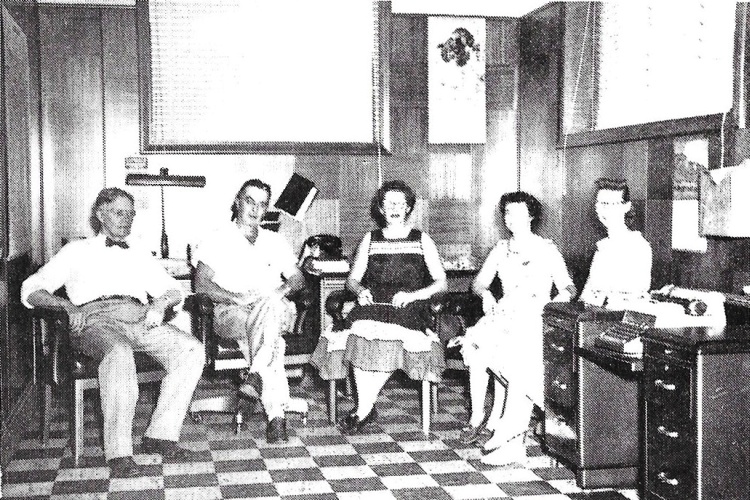
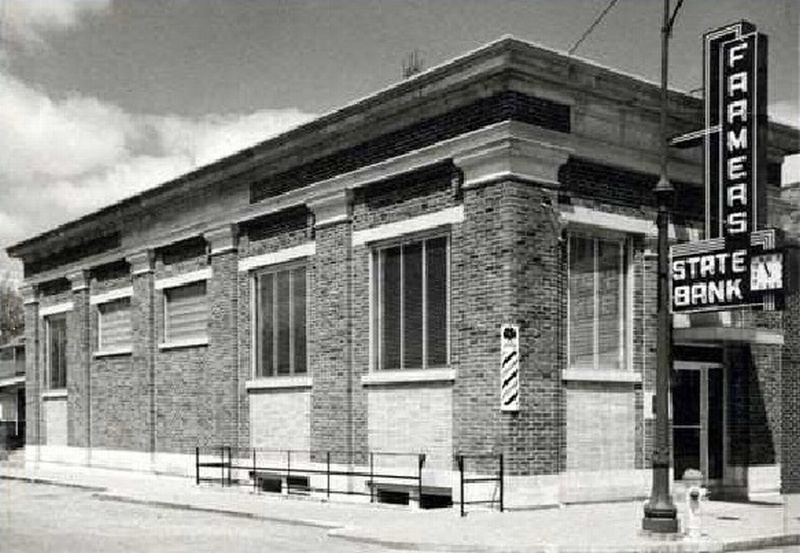
 |
 |